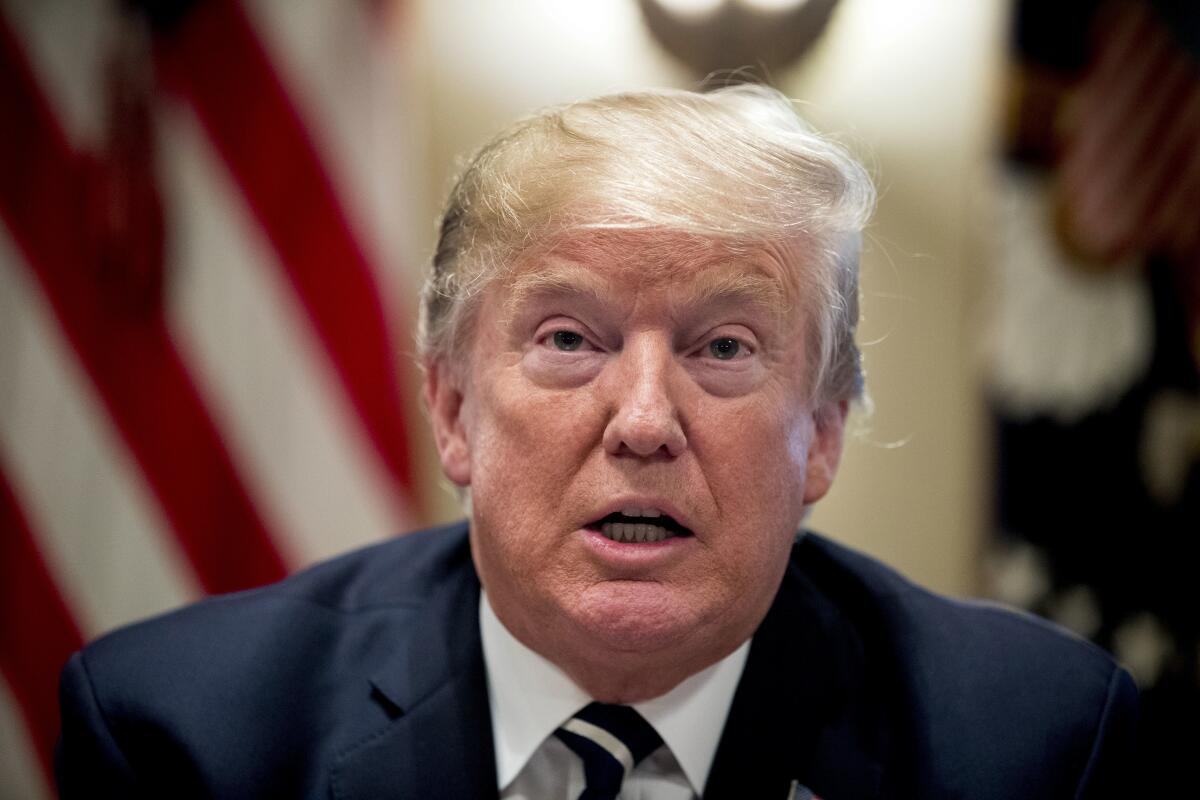Judge in Trump election case pauses court deadlines amid presidential immunity appeal

- Share via
WASHINGTON — Donald Trump’s election interference case in Washington will be put on hold while the former president further pursues his claims that he is immune from prosecution, a judge ruled Wednesday.
The decision from U.S. District Judge Tanya Chutkan raises the likelihood that Trump’s trial on charges of plotting to overturn the 2020 election, currently scheduled for March 4, will be postponed as the appeal of a legally untested argument winds through the courts.
The issue is of paramount significance to both sides given that a court ruling in Trump’s favor would presumably derail the case and because a protracted appeal could result in a significant postponement of the proceedings, potentially until after next year’s election, that may benefit the ex-president as he seeks to reclaim the White House.
The three-page order is the latest volley in a simmering dispute over the scope of presidential power that has the potential to be decided by the Supreme Court for the first time in American history.
After Chutkan this month turned aside Trump’s claims that he was shielded from prosecution for actions he took while fulfilling his duties as president, his lawyers asked a Washington-based appeals court to review the decision and urged the judge to freeze the case in the meantime.
But special counsel Jack Smith, in a sign of both the gravity of the issue and his determination to keep the case on schedule, sought to leapfrog the appeals court by asking the Supreme Court on Monday to fast-track an opinion on the immunity question that would permit the case to proceed. The court indicated that it would decide quickly whether to take the case up, ordering Trump’s lawyers to respond by Dec. 20. But it did not signal what it would ultimately do.
The Supreme Court dealt further uncertainty to the timing and overall fate of the case Wednesday as it said it would review a charge of obstruction of an official proceeding that has been brought against more than 300 participants in the Jan. 6, 2021, insurrection at the U.S. Capitol. The charge is one of four brought by Smith against Trump, so a ruling in favor of the rioters accused or convicted of crimes could upend those cases but also affect the prosecution of the former president.
The argument that Trump is immune from prosecution for actions taken within his role as president has for months been seen as perhaps the most weighty and legally consequential objection to the case made by the Trump lawyers ahead of trial. No former president has ever been prosecuted before, a lack of historical precedent Trump’s team has seized on in trying to get the indictment tossed out.
A Supreme Court case usually lasts several months, from the time the justices agree to hear it until a final decision. Smith is asking the court to move with unusual, but not unprecedented, speed.
Nearly 50 years ago, the justices acted within two months of being asked to force President Nixon to turn over Oval Office recordings in the Watergate scandal. The tapes were then used later in 1974 in the corruption prosecutions of Nixon’s former aides.
It took the high court just a few days to in effect decide the 2000 presidential election for Republican George W. Bush over Democrat Al Gore.
If the justices decline to step in at this point, Trump’s appeal would continue at the U.S. Court of Appeals for the D.C. Circuit. Smith said even a rapid appellate decision might not get to the Supreme Court in time for review and final word before the court’s traditional summer break.
Trump faces four criminal prosecutions in four different cities. He is charged in Florida with illegally retaining classified documents at his Mar-a-Lago estate and faces a state prosecution in Georgia that accuses him of trying to subvert that state’s 2020 presidential election and a New York case that accuses him of falsifying business records in connection with a hush money payment to a porn actor.
More to Read
Get the L.A. Times Politics newsletter
Deeply reported insights into legislation, politics and policy from Sacramento, Washington and beyond. In your inbox twice per week.
You may occasionally receive promotional content from the Los Angeles Times.










